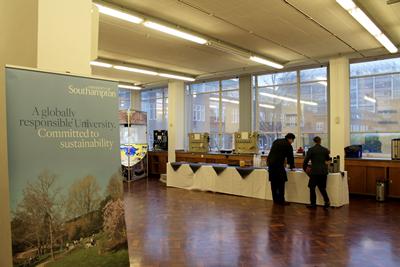Undergraduate and postgraduate students could apply to present their research through a poster at the symposium. The winners for the undergraduate and postgraduate posters were awarded a £50 John Lewis voucher each. Read about and download all the posters.

Factors Associated with Condom Use at First Heterosexual Intercourse in British Adolescents: Kate L Heap (University of Southampton) - Undergraduate Winner
With the United Kingdom having high teenage pregnancy and sexual transmitted infection (STI) rates, this research (pdf) investigates the relationship between first heterosexual intercourse (FHI), risk of pregnancy and STIs, condom and or contraceptive use, and later sexual risk taking.
The Potential of Agent-Based Modelling as a Tool to Unravel the Complexity of Household Food Security: a Case Study of Rural Southern Malawi: Samantha Dobbie (University of Southampton) - Postgraduate Winner
The aim of this project (pdf) was to develop a simple agent-based model that takes into account the availability, access, utilisation and stability dimensions of food security; which could be used to explore potential pathways towards sustainable food systems and the alleviation of food insecurity with rural Southern Malawi.
Genetics and Food Security in the developing world: Sonal Chagan (University of Southampton)
Food security is the attainment of sufficient, nutritious and safe food for everyone. In examining the strengths and limitations of genetics in meeting Goal 2: ‘Zero Hunger’ of the 2015 Sustainable Development Goals (SDGs), this research (pdf) looks towards genetics of plants in terms of preparing future food security.
A pilot study: Computational Analysis of a Cause and Treatment of Knee Pain in Young Adults and Adolescents: Shruti Verma (University of Southampton)
Patellofemoral Pain Syndrome (PFPS) affects 20% of young adults and adolescents, causing chronic knee pain. There is limited research into the effects of patella alignment in PFPS; hence, the evidence base for treatments is limited though patella taping is common. Its success is heavily debated, particularly with patients applying their own taping. This research (pdf) explores its effectiveness.
Adaptive Re-Use: A Sustainable Solution for Southampton's Bargate Shopping Centre?: Dominika Slotwinski (University of Southampton)
Since the opening of the WestQuay Shopping Centre in 2000 and the ongoing competition with the Marlands Shopping Centre (opened in 1991), Bargate has struggled to maintain its popularity with the general public. Research (pdf) into 'adaptive re-use' for obsolescent buildings suggests that in terms of sustainability, a multifaceted 'indoor market' would be the most suitable adaptation for the building: socially, economically and environmentally
Teachers' Perceptions of Virtual Laboratory use in Secondary School Chemistry Education:Ramrajiv Rajendram (University of Southampton)
Technology can be used to enhance the effectiveness of practical work in chemistry education. This research (pdf) provides evidence that virtual laboratory use is not prevalent as it is supposed to be. Despite acknowledging the advantages that virtual laboratories possess, teachers perceive virtual laboratories not to be a realistic and quality substitute to traditional laboratories to a great extent.
Changing Research Attitudes through Improved Sustainability: June Lovitt & Timothy Deehan (University of Southampton)
Methods within chemical procedures are generally taught in a rigorous fashion containing generations of knowledge which hold influence over attitudes. On discovering the limited sustainability of certain methods, a new stance (pdf) has been taken to improve this.
Effect of Manganese-doped Cobalt Oxide Calcination Temperature on the Bifunctional Catalysis of the Oxygen Reduction and Evolution Reactions: Alexander Pateman (University of Southampton)
Oxygen reduction (ORR) and oxygen evolution (OER) reactions are important in the operation of renewable energy sources, yet precious metals are usually used within the reactions. This research (pdf) looks into a material resource change as to realistically allow the reactions to occur.
The Bottom Line of Community Energy: Mehrnaz Tajmir (University of Bath)
By focusing upon the recent Feed-in Tariff cuts, this research (pdf) will begin to explore the question of; “Will community energy programs, in particular Solar, survive these sudden cuts?” through the use of an active community energy example; Moorhouse Farm in Bristol.